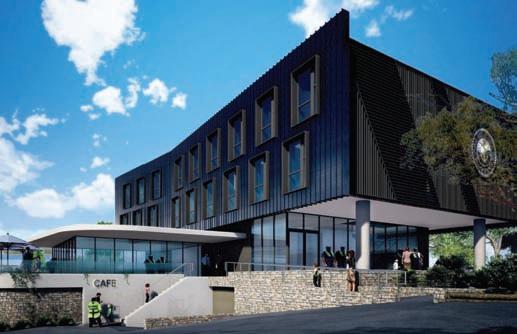
3 minute read
$12m Training Academy first in Australia
$12m Training Academy first in Australia There could not be a better investment for the boaters of NSW: Chair.
Marine Rescue NSW will develop Australia’s first dedicated marine rescue training academy in a $12 million project to ensure more skilled volunteers are ready to save lives on the water.
Emergency Services Minister David Elliott and Attorney General, Cronulla MP Mark Speakman, formally announced on June 6 that the Academy would be developed on the MRNSW Headquarters site on the Hungry Point Reserve, at Cronulla.
“This state-of-the-art facility will ensure we have more fully trained first responders on the marine radio airwaves and water to rescue boaters caught in life-threatening emergencies on NSW waterways,” Mr Elliott said.
“Professional training is essential to equip every member of the team with the knowledge and skills they need to bring boaters home safely.”
He said the State Government was a proud supporter of MRNSW volunteers, investing an additional $37.6 million in new vessels, improved operating facilities and the marine radio network.
“When you’re enjoying our waterways, it’s quite likely that the first line of defence, the first operational capability that may come to you in the event that you’re in trouble, will be a volunteer,” he said.
“It’s very, very dangerous work; it’s work that’s essential and it’s work that certainly saves the taxpayers. The least we can do as a government and as a society is to ensure they have the best possible training that money can buy.”
The Hungry Point Reserve Crown Land Management Committee named the Academy as the preferred use for the site in a public Expression Of Interest process. The self-contained campus, to cater for up to 100 trainees a week, will include a large lecture/ meeting room, smaller classrooms
Attorney General Mark Speakman, MRNSW Chair Jim Glissan, Commissioner Stacey Tannos and Emergency Services Minister David Elliott announce the MRNSW Training Academy.
equipped with marine simulators and other learning tools, outdoor training areas and a pool, along with accommodation and meal facilities.
Trainees will be able to undertake small-group intensive residential and day courses in subjects including first aid and advanced resuscitation, sea survival, firefighting at sea, marine radio operations, rescue vessel crew, coxswain and Rescue Water Craft operations and search and rescue coordination.
The Academy also will help boost boating safety by offering public boat licence and marine radio courses and on-site collection facilities for boaters to dispose of expired safety flares, EPIRBs, batteries and other equipment.
Mr Speakman said the Academy was an “excellent outcome for Marine Rescue, for water safety and for respecting the site’s Indigenous, European and multi-cultural history”.
“This is a training centre that will respect the maritime history of this site but also respect the Indigenous history and the important cultural history of the site,” he said. “It’s a beautiful site. It’s also an iconic site for Shire residents, who can now enjoy the open space here.
“It’s also wonderful, too, to have a primary occupier, in Marine Rescue, that is community based. This is not a commercial enterprise, this a
Subject to consultation and discussion ... an initial concept design for the $12m MRNSW Training Academy on the Hungry Point Reserve.

voluntary organisation, a grassroots organisation that does such wonderful volunteer work keeping people safe on our waterways.”
MRNSW Commissioner Stacey Tannos hailed the announcement of the Training Academy, at the end of the service’s 10th anniversary year, as another significant milestone.
“The Training Academy will be the first of its kind in Australia,” he said.
“It will be a one-stop-shop where you will be able to do everything that’s needed in all aspects of training for Marine Rescue - be it on a boat, on radio, administration, leadership courses - in the one place,” he said.
He said enabling members to complete their training more quickly would encourage volunteer retention and engagement, strengthening the service’s sustainability. He said consolidated block training could cut the time taken to obtain various qualifications from a year or more.
MRNSW Chair Jim Glissan said there could not be a better investment for the boaters of NSW.
“Marine Rescue volunteers are the first responders on the water,” he said. “If somebody suffers an accident or distaster on the water, it is we who will be the first people who are called out. We, therefore, need to make sure our volunteers are trained to the very, very best level that is possible. We are extraordinarily grateful to the government of NSW for both its monterary support and its support in securing for us this wonderful site.”










